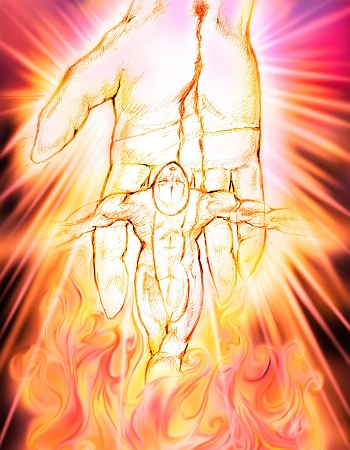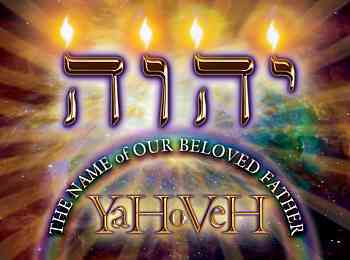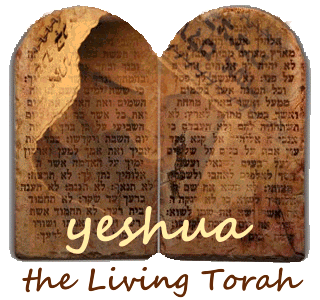
|
|
For YHVH is a Consuming Fire... Deuteronomy 4:24, Hebrews 12:29 |
"the Law"?
Part Five: To Know Him
by haRold Smith
a citizen of the Commonwealth (Eph.2:12)
"My little children, I am writing these things to you so that you may not sin. But if anyone does sin, we have an advocate with the Father, Yeshua haMashiach, the Righteous. Yeshua is the propitiation for our sins, and not for ours only but also for the sins of the whole world. And by this we know that we have come to know YHVH, if we keep His Words (commandments). Whoever says "I know Him" but does not keep His commandments is a liar, and the Truth is not in him, but whoever keeps His Word, in him truly the Love of YHVH is perfected. By this we may know that we are in Him: whoever says he abides in Him ought to walk in the same way in which He walked." 1John 2:1-6
"IF you will diligently listen to and obey the Voice of YHVH, your Elohiem, and do that which is right in HIS eyes, and give ear to HIS commandments and keep all HIS statutes, I will put none of the diseases on you that I put on the Egyptians, for I am YHVH, your Healer." Exodus 15:26
I got sick. I got real sick - and I was getting sicker. Nothing I did seemed to slow the effects this disease was having on my extremities, bubbling up and spreading over my body. Day after day my flesh was consumed, destroyed of life by this unrelenting advance which left me weak, crippled and in much pain. I was also enduring the pain of confusion - how can a believer be subjected to this kind of suffering when YHVH's Words from Exodus above clearly indicates otherwise? Nothing but angst was raging within me over what I perceived as a conflict between what was written on the pages of scripture and the reality of what was playing out over my body.
Most who read this verse from Exodus 15 above miss the most critical part included in every translation - the first word "IF". I was befuddled because I was sure I had been keeping the Ten Words of the Father found in Exodus 20:1-17 (what have come to be known as "commandments" click on highlighted words to view scripture). As I was seeking illumination to my situation, I can still hear the words of Spirit ringing through my being in the answer to my petition laid before YHVH, "You are a murderer!" My response was immediate and livid, "Not ME!! I haven't even smacked anyone!"; and, then, more subdued I asked, "How can that be? I haven't murdered anyone, taken anyone's life - have I?"
As soon as I began to contemplate what I had heard, a recent encounter with a brother in the faith who had expressed a need in my presence came to mind. His need was not life-threatening nor did it place his family in any kind of jeopardy, but it was a need nonetheless - one that I could help with and volunteered to meet. Immediately afterward, circumstances forced me to focus on another problem and I put off attending to the need of my brother as I had promised. Other events cropped up, time went by, excuses were made, more time went by, procrastination set in, justifications were advanced (I mean, after all, nobody was dying or anything - right?), more time passed until it just became neglect. During this passage of time, an awkwardness had set in between us where neither one spoke to the other because there was this thing that had grown uncomfortably between us. We became separated in Spirit - and I got sick.
The words of 1John 2 and 1John 3 also began to cross my mind as I contemplated the possibility I might actually be out of step with YHVH - it is amazing how a crisis can soften an attitude (see what it means to come into Agreement with YHVH). My perception of what it means to "murder" began to change as these verses of scripture say that if I have the means to meet the need of a brother and do not, then I am guilty of murder - clearly outside what is contained in the Ten. Now, if scripture is true from cover to cover - how does the writer get from neglecting the need of a brother to murder? Equating neglect of need to the taking of life - how does that work?

|
|
Consumed and Bewildered |
Much of the misunderstanding and, thus, mishandling of scripture comes as a result of a piece of religious legislation known as replacement theology, that was formally embraced some 325 years after the Resurrection by the hierarchy of a new religion called "Christianity". This theology was used as justification for creating a distinction between believers in the Hebrew Messiah that enabled many of the non-ethnic Jewish among them (whose belief, by this time, had morphed into a Latin "Christ") to separate themselves from the horrendous persecution inflicted on their Jewish brothers by the Roman Empire (see My Big Fat Greek Mindset PART 1 and PART 2). Basically, this theology depicts the attitude that the Jews had been given their shot and blew it - so God abandoned them, giving His Favor to Gentiles instead (raising the question of the trustworthiness of such a capricious God toward me today). It is from this paradigm most try to convince themselves they understand what is meant by these words from authors of a different culture they have not taken the time to learn about because their relevance has been dismissed - and then wonder why they are sick (see In Addition).
One illustration of this lost nuance through the transcendence of culture upon words comes in understanding the meaning attached to the word "hate". Most of the world views scripture from a Westernized/Greek influenced mindset of moralistic imperatives - a collection of good principles and noble actions to live by which promotes the governance of a harmonious societal framework. This philosophy can be traced back to the Greek influences of Plato and Socrates, whose idealistic principles were formed out of a basis in worship of many different gods. This philosophy is devoid of the perspective of the One True Hebrew Spirit spoken of from cover to cover in scripture but is frequently found embedded in traditional Christian religious doctrine advanced through the theological paradigm based on Greek metaphysics initiated by Augustine’s love affair with Platonism and has seriously misled the Church (see One Spirit, One Name).
From this moralistic viewpoint, hatred is identified primarily as an emotion - a blind rage, so to speak, where emotion overwhelms reason ultimately resulting in the taking of a human life and, thus, forming the basis for the necessity of imposed regulation. From the Hebrew perspective, however, hatred is not found to be an emotion. While there may be feelings associated with it, hatred like love, is primarily a choice of will (see what it means to be Gatekeepers). The hatred found in scripture, both in the Greek as well as the Hebrew is defined behaviorally through acts of hostility, disparagement and aversion (which means separation). To despise something means having nothing to do with it. YHVH's view of hatred is expressed in the first two of the Ten Words:
| "You shall not worship or serve any other gods, for I, YHVH, your Elohiem am a jealous God, visiting the iniquity of the fathers on the children to the third and the fourth generation of those who hate Me, but showing steadfast love to thousands of those who love Me and keep My commandments ." Exodus 20:5-6 |
Yeshua's Words support and reinforce YHVH's perspective:
|
"If you keep My commandments, you will abide in My love,
just as I have kept My Father’s commandments and abide in His love
. Whoever does not love Me does not keep My words
...and the word that you hear is not Mine but the Fathers who sent Me ." John 15:10, 14:24 |
A previous article, the Beatitudes, verified there are no "new" commandments appearing in scripture that replace the old, The single commandment Yeshua does acknowledge as being "new" is found in John 13:34 where He says to love one another in the same manner of Life He lived out among them - and His statement there is simply a narrowing of Leviticus 19:18. Notice, however, that word was not addressed to the world, Yeshua is speaking to those few gathered in His Presence that day - the brethren. By behaving toward each other, loving each other in the same way He exampled toward them, the world would then know that they are His disciples. How did Yeshua "love" them? 1John 3:16 tells us how we know love. There is a dynamic of behavior in these words that goes far beyond the world view of "giving to the poor" and "loving everyone". (see Just As-Even So to look into this dynamic).

|
|
"...giving them power and authority over all demons and to cure diseases, sending them to proclaim the Kingdom of YHVH and to heal." Luke 9:1-2 |
As mentioned earlier, what have come to be known traditionally through the centuries as the "Ten Commandments" are not actually commands at all. The first verse of Exodus 20 states simply, "…and YHVH spoke all these Words" - no commands, just Words that define the Nature of the difference between Light and darkness, Life and death. In the original Hebrew, Adam was instructed (not commanded) that he was free to "eat of any tree in the garden", even the Tree of Life - but never told he had to (see Genesis 2:16 in the Hebrew Interlinear Bible). This revealing of the heart and Nature of YHVH that, by the keeping of His Words, "…it might go well with you" continues in Jeremiah 7:22-23. To sin is to transgress, to voluntarily disobey the Words of YHVH. To abide in YHVH means we do not sin (1John 3:4-6). To abide in YHVH means to choose to keep His Words (John 14:23-24, see what it means to Abide in His Name).
In the same regard, most overlook that the actions of the believers Ananias and Sapphira were voluntary - there was nothing forced upon them concerning their property (Acts 5:1-11). On the surface, what they actually did does not seem that severe (just practicing a bit of the prosperity message of today). Where they got into trouble was in lying about their subsequent deception and not repenting when confronted. Their behavior exhibited a lack of knowing YHVH by not understanding the Power they were dealing with - the "consuming fire" now contained within the Body of Yeshua (believers in Yeshua as the promised Hebrew Messiah). The result of that episode was that the rest of the Body "feared YHVH" - much in the same way a child cultivates a healthy respect for an open flame having once been burned (see a Nation of Priests for more explanation).
"I have accepted Jesus Christ into my heart and am saved because He took away all of my sin." Have you ever noticed that this statement cannot be found in scripture? And yet, it is touted in virtually every Christian quarter as "the Gospel of Salvation" (another phrase not found in scripture - see the Gospel). Now, please do not become offended with these questions, but finding Truth comes with a recognition that, because Truth is Light, Truth will withstand the harshest light of scrutiny and never waver. So, if these words quoted above are Truth, then why do we find the Hebrew Messiah, Yeshua, saying to those whose sins were, supposedly, "taken away" causing them to be healed, to "…sin no more" - as though, just maybe, they might have had some choice in the matter? (John 5:14, John 8:11, see how to go about Cultivating Virtue).
If Yeshua is the benchmark by which we are to measure Truth (see Arrows of Famine); then, in spite of all the commentaries of men, all the traditional theology or doctrinal thought handed down through centuries of religion and regardless of the widely accepted culture that has grown up surrounding the phrase quoted above - if we are to be intellectually honest with just the words of scripture written on the page, why is it we never once find the One Who should know telling us to make this statement or anything close to it? (see Salvation and Eternal Life)
| "... you do not have YHVH's Word abiding in you, for you do not believe the One Whom He has sent . You search the Scriptures because you think that in them you have eternal life; and it is they that bear witness about Me, yet you refuse to come to Me that you may have Life… For if you believed Moses, you would believe Me; for he wrote of Me. But if you do not believe his writings, how will you believe My words ?" John 5:38-47 |

|
|
...to keep His Words is to believe in His Name |
From the Hebrew perspective, the definition for "believe" is actionable - meaning it requires some sort of action to be evidenced (Deuteronomy 11:16, Luke 4:8). To Believe is to embrace YHVH's Nature as our own. Keeping the Words of the Father, the definition of His Nature, IS to believe. Scripture is not "the Word" - YHVH is the Word. Yeshua is not "the Word" - the opening verse of the first chapter of John tells us that YHVH is the Word. Nowhere in scripture is Yeshua ever given the title, "the Word" - it is only an assumption to believe it to be so. While Yeshua is One with YHVH, He does not replace YHVH. Read the article, the Word for a more in-depth look.
| "For if while we were enemies we were reconciled to YHVH by the death of his Son, much more, now that we are reconciled , shall we be saved by His Life." Romans 5:10 |
Notice in this verse from Romans the apostle Sha'ul (Paul) shows his understanding that it is after a reconciliation to YHVH occurs that, by the doing of the Life the Son exampled we are saved. That example is in the keeping of the Words of the Father (John 15:10). Who, then, is an "enemy" of YHVH? Sha'ul tells us in this passage through the use of the Greek word echthros, (translated "enemies") which means "to hate". An enemy is anyone who separates themselves from YHVH by not keeping His Words - those who will not come to "know" Him. We have been conditioned to think of an enemy as someone like Pharoah of Egypt who YHVH singles out to arbitrarily make an example of. But, if that were true - it would run counter to His expressed Nature that wants all men to be saved. Scripture tells us Pharoah had choice like anyone, becoming an enemy only after refusing to come to know YHVH and, with each repeated overture to the Presence of Light, his heart became increasingly hardened by the darkness he embraced as chronicled in Exodus 5:2, Exodus 7:1 and Exodus 7:13.
So, the scriptural difference between loving YHVH and hating YHVH is exhibited by our choice of behavior in whether we abide in His Light, which is the Source of Life, or we abide in darkness, which is death. Anything apart from Life is death - there is no middle ground. Just as it is impossible for Light and darkness to occupy the same space at the same time - so it is for Life and death to be present in the same vessel (see the Law of Grace for an expanded explanation). To hate YHVH is to move away from His Light by moving away from His Nature expressed in His Words - thus, an aversion to His Words results in becoming separated into darkness. Which, then, of His Words His commandments, do we keep? There seems to be a lot picking and choosing in many circles about the validity of keeping all Ten of His Words.
From a Hebrew perspective, there is only one sin - a separation from the Source of Life that is YHVH caused by disobedience to His Word(s). It only takes a breaking of one of His Words to become separated from Light and to be found in a place of darkness - death. James 2:10 says that if we break just one Word we are guilty of all because the result is the same regardless of which one we transgress. Since true believers occupy but One Spirit, a sin against a brother is a sin against the Father (see what it means to be in Communion). To break one is to break them all because we are either in His Presence or we are not, There is no middle ground of distinction between Light and darkness because in Him there is no darkness at all (1John 1:5). It only takes walking through one door of disobedience to enter into the same house of darkness as if you had walked through them all. Because of their deceitfulness in lying, Ananias and Sapphira were equally as guilty of adultery, which is an infidelity of spirit - even though there was no physical sexuality involved. The definition of darkness is the absence of Light - death is anywhere Life is not (see how to Abide In His Name).

|
We do have an advocate with the Father regarding this issue of sin - it is the Life of Yeshua (1John 2:1, see how to go about Inhabiting Inheritance). The moment I repented (which means to walk 180 degrees in the opposite direction behaviorally), asking my brother to forgive me and completing my vow, I could literally feel the reversal in my body as the healing process began. Within a couple of weeks, my health had returned, my energy was revitalized and I was praising YHVH for the faithfulness of His Nature expressed in His Words. To know YHVH is to embrace those Words, healing the separation from Light, from Life.
YHVH created man to follow His Instructions. It is possible to lead a sinless life. Click HERE to find out how.
Part One - Torah or "the Law"
Part Two - the Curse of the Law?
Part Three - Under the Law?
Part Four - Legalism
Part Five - To Know Him
|
"For this is the love of YHVH, that we keep His commandments. And His commandments are not burdensome." 1John 5:3 |
???Questions???
Please feel free to email me at harold@hethathasanear.com. While not claiming to have all the answers, it would be an honor to partake with you of what the Spirit is uncovering.